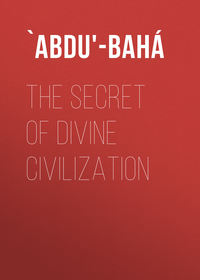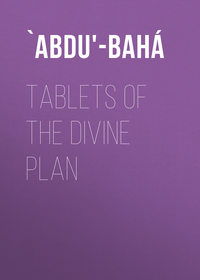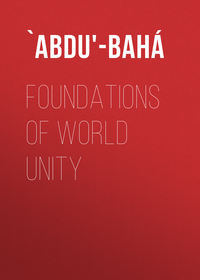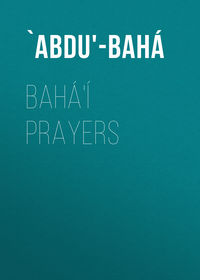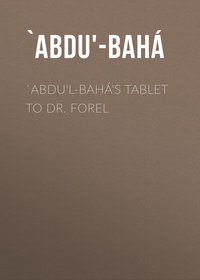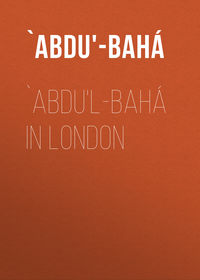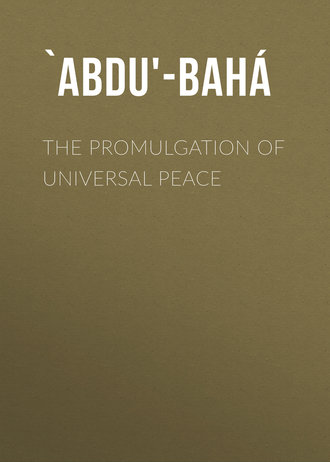 полная версия
полная версияThe Promulgation of Universal Peace
History records the appearance in the world of women who have been signs of guidance, power and accomplishment. Some were notable poets, some philosophers and scientists, others courageous upon the field of battle. Qurratu’l-‘Ayn, a Bahá’í, was a poetess. She discomfited the learned men of Persia by her brilliancy and fervor. When she entered a meeting, even the learned were silent. She was so well versed in philosophy and science that those in her presence always considered and consulted her first. Her courage was unparalleled; she faced her enemies fearlessly until she was killed. She withstood a despotic king, the Sháh of Persia, who had the power to decree the death of any of his subjects. There was not a day during which he did not command the execution of some. This woman singly and alone withstood such a despot until her last breath, then gave her life for her faith.
Consider the mysteries revealed during the last half century, all due to the effulgence of the Sun of Reality, which has been so gloriously manifested in this age and cycle. In this day man must investigate reality impartially and without prejudice in order to reach the true knowledge and conclusions. What, then, constitutes the inequality between man and woman? Both are human. In powers and function each is the complement of the other. At most it is this: that woman has been denied the opportunities which man has so long enjoyed, especially the privilege of education. But even this is not always a shortcoming. Shall we consider it an imperfection and weakness in her nature that she is not proficient in the school of military tactics, that she cannot go forth to the field of battle and kill, that she is not able to handle a deadly weapon? Nay, rather, is it not a compliment when we say that in hardness of heart and cruelty she is inferior to man? The woman who is asked to arm herself and kill her fellow creatures will say, “I cannot.” Is this to be considered a fault and lack of qualification as man’s equal? Yet be it known that if woman had been taught and trained in the military science of slaughter, she would have been the equivalent of man even in this accomplishment. But God forbid! May woman never attain this proficiency; may she never wield weapons of war, for the destruction of humanity is not a glorious achievement. The upbuilding of a home, the bringing of joy and comfort into human hearts are truly glories of mankind. Let not a man glory in this, that he can kill his fellow creatures; nay, rather, let him glory in this, that he can love them.
When we consider the kingdoms of existence below man, we find no distinction or estimate of superiority and inferiority between male and female. Among the myriad organisms of the vegetable and animal kingdoms sex exists, but there is no differentiation whatever as to relative importance and value in the equation of life. If we investigate impartially, we may even find species in which the female is superior or preferable to the male. For instance, there are trees such as the fig, the male of which is fruitless while the female is fruitful. The male of the date palm is valueless while the female bears abundantly. Inasmuch as we find no ground for distinction or superiority according to the creative wisdom in the lower kingdoms, is it logical or becoming of man to make such distinction in regard to himself? The male of the animal kingdom does not glory in its being male and superior to the female. In fact, equality exists and is recognized. Why should man, a higher and more intelligent creature, deny and deprive himself of this equality the animals enjoy? His surest index and guide as to the creative intention concerning himself are the conditions and analogies of the kingdoms below him where equality of the sexes is fundamental.
The truth is that all mankind are the creatures and servants of one God, and in His estimate all are human. Man is a generic term applying to all humanity. The biblical statement “Let us make man in our image, after our likeness” does not mean that woman was not created. The image and likeness of God apply to her as well. In Persian and Arabic there are two distinct words translated into English as man: one meaning man and woman collectively, the other distinguishing man as male from woman the female. The first word and its pronoun are generic, collective; the other is restricted to the male. This is the same in Hebrew.
To accept and observe a distinction which God has not intended in creation is ignorance and superstition. The fact which is to be considered, however, is that woman, having formerly been deprived, must now be allowed equal opportunities with man for education and training. There must be no difference in their education. Until the reality of equality between man and woman is fully established and attained, the highest social development of mankind is not possible. Even granted that woman is inferior to man in some degree of capacity or accomplishment, this or any other distinction would continue to be productive of discord and trouble. The only remedy is education, opportunity; for equality means equal qualification. In brief, the assumption of superiority by man will continue to be depressing to the ambition of woman, as if her attainment to equality was creationally impossible; woman’s aspiration toward advancement will be checked by it, and she will gradually become hopeless. On the contrary, we must declare that her capacity is equal, even greater than man’s. This will inspire her with hope and ambition, and her susceptibilities for advancement will continually increase. She must not be told and taught that she is weaker and inferior in capacity and qualification. If a pupil is told that his intelligence is less than his fellow pupils, it is a very great drawback and handicap to his progress. He must be encouraged to advance by the statement, “You are most capable, and if you endeavor, you will attain the highest degree.”
It is my hope that the banner of equality may be raised throughout the five continents where as yet it is not fully recognized and established. In this enlightened world of the West woman has advanced an immeasurable degree beyond the women of the Orient. And let it be known once more that until woman and man recognize and realize equality, social and political progress here or anywhere will not be possible. For the world of humanity consists of two parts or members: one is woman; the other is man. Until these two members are equal in strength, the oneness of humanity cannot be established, and the happiness and felicity of mankind will not be a reality. God willing, this is to be so.
2 May 1912
Talk at Bahá’í Women’s Reception
Hotel La Salle, Chicago, Illinois
Notes by Joseph H. HannenWhen we look upon the kingdoms of creation below man, we find three forms or planes of existence which await education and development. For instance, the function of a gardener is to till the soil of the mineral kingdom and plant a tree which under his training and cultivation will attain perfection of growth. If it be wild and fruitless, it may be made fruitful and prolific by grafting. If small and unsightly, it will become lofty, beautiful and verdant under the gardener’s training, whereas a tree bereft of his cultivation retrogresses daily, its fruit grows acrid and bitter as the trees of the jungle, or it may become entirely barren and bereft of its fruitage. Likewise, we observe that animals which have undergone training in their sphere of limitation will progress and advance unmistakably, become more beautiful in appearance and increase in intelligence. For instance, how intelligent and knowing the Arabian horse has become through training, even how polite this horse has become through education. As to the human world: It is more in need of guidance and education than the lower creatures. Reflect upon the vast difference between the inhabitants of Africa and those of America. Here the people have been civilized and uplifted; there they are in the utmost and abject state of savagery. What is the cause of their savagery and the reason of your civilization? It is evident that this difference is due to education and the lack of education. Consider, then, the effectiveness of education in the human kingdom. It makes the ignorant wise, the tyrant merciful, the blind seeing, the deaf attentive, even the imbecile intelligent. How vast this difference. How wide the chasm which separates the educated man from the man who lacks teaching and training. This is the effect when the teacher is merely an ordinary teacher.
But—praise be to God!—your Teacher and Instructor is Bahá’u’lláh. He is the Educator of the Orient and Occident. He is the Teacher of the very world of divinity and spirituality, the Sun of Truth, the Word of God. The lights of His education are radiating even as the sun. See what it has accomplished, how it is developing all humanity so that I, a Persian, have come to this meeting of revered souls upon the American continent and am standing here expounding to you in the greatest love. This is through the training of Bahá’u’lláh, which can unite and has united these hearts. In this way it has enlightened the world. Even so it has breathed the spirit of God into men. Even so it has resuscitated the hearts of men.
Therefore, praise be to God that you have been brought under the education of this One Who is the very Sun of Reality and Who is shining resplendently upon all humankind, endowing all with a life that is everlasting.
Praise be to God a thousand times!
2 May 1912
Talk at Hotel Plaza
Chicago, Illinois
Notes by Marzieh MossThis morning the city is enveloped in fog and mist. How beautiful is a city brilliant with sunshine. Just as these mists and vapors conceal the phenomenal sun, so human imaginations obscure the Sun of Truth. Consider the radiant glory of the great solar center of our planetary system: how wonderful the sight, how its splendor illumines vision until clouds and mists veil it from the eye. In the same way, the Sun of Truth becomes veiled and hidden by the superstitions and imaginations of human minds. When the sun rises, no matter from what dawning point on the horizon it appears—northeast, east, southeast—the haze and mists disperse, and we have clear vision of its glory mounting to the zenith. Similarly, the nations have been directed to the dawning points of the Sun of Reality, each to a particular rising place from which the light of religion has become manifest; but after a time the dawning point has become the object of worship instead of the Sun itself, which is ever one Sun and stationary in the heavens of the divine Will. Differences have arisen because of this, causing clouds and darkness to overshadow again the glorious luminary of Reality. When the mists and darkness of superstition and prejudice are dispersed, all will see the Sun aright and alike. Then will all nations become as one in its radiance.
Inasmuch as these clouds and human vapors of superstition hide the light of the spiritual Sun, we must put forth our utmost endeavor to dispel them. May we unite in this and be enlightened to accomplish it, for the Sun is one and its radiance and bounty universal. All the inhabitants of earth are recipients of the bounty of the one phenomenal sun, and none are preferred above others; so, likewise, all receive the heavenly bestowals of the Word of God; none are specialized as favorites; all are under its protection and universal effulgence. Human strife and religious disagreement complex and disfigure the simple purity and beauty of the divine Cause until clouds obscure the light of reality and disunion results. Therefore, make use of intelligence and reason so that you may dispel these dense clouds from the horizon of human hearts and all hold to the one reality of all the Prophets. It is most certain that if human souls exercise their respective reason and intelligence upon the divine questions, the power of God will dispel every difficulty, and the eternal realities will appear as one light, one truth, one love, one God and a peace that is universal.
2 May 1912
Talk at Hotel Plaza
Chicago, Illinois
Notes by Henrietta C. WagnerWhen we carefully investigate the kingdoms of existence and observe the phenomena of the universe about us, we discover the absolute order and perfection of creation. The dull minerals in their affinities, plants and vegetables with power of growth, animals in their instinct, man with conscious intellect and the heavenly orbs moving obediently through limitless space are all found subject to universal law, most complete, most perfect. That is why a wise philosopher has said, “There is no greater or more perfect system of creation than that which already exists.” The materialists and atheists declare that this order and symmetry is due to nature and its forces; that composition and decomposition which constitute life and existence are exigencies of nature; that man himself is an exigency of nature; that nature rules and governs creation; and that all existing things are captives of nature. Let us consider these statements. Inasmuch as we find all phenomena subject to an exact order and under control of universal law, the question is whether this is due to nature or to divine and omnipotent rule. The materialists believe that it is an exigency of nature for the rain to fall and that unless rain fell the earth would not become verdant. They reason that if clouds cause a downpour, if the sun sends forth heat and light and the earth is endowed with capacity, vegetation must inevitably follow; therefore, plant life is a property of these natural forces and is a sign of nature; just as combustion is the natural property of fire, therefore, fire burns, and we cannot conceive of fire without its burning.
In reply to these statements we say that from the premises advanced by materialists, the conclusions are drawn that nature is the ruler and governor of existence and that all virtues and perfections are natural exigencies and outcomes. Furthermore, it follows that man is but a part or member of that whereof nature is the whole.
Man possesses certain virtues of which nature is deprived. He exercises volition; nature is without will. For instance, an exigency of the sun is the giving of light. It is controlled—it cannot do otherwise than radiate light—but it is not volitional. An exigency of the phenomenon of electricity is that it is revealed in sparks and flashes under certain conditions, but it cannot voluntarily furnish illumination. An exigency or property of water is humidity; it cannot separate itself from this property by its own will. Likewise, all the properties of nature are inherent and obedient, not volitional; therefore, it is philosophically predicated that nature is without volition and innate perception. In this statement and principle we agree with the materialists. But the question which presents food for reflection is this: How is it that man, who is a part of the universal plan, is possessed of certain qualities whereof nature is devoid? Is it conceivable that a drop should be imbued with qualities of which the ocean is completely deprived? The drop is a part; the ocean is the whole. Could there be a phenomenon of combustion or illumination which the great luminary the sun itself did not manifest? Is it possible for a stone to possess inherent properties of which the aggregate mineral kingdom is lacking? For example, could the fingernail which is a part of human anatomy be endowed with cellular properties of which the brain is deprived?
Man is intelligent, instinctively and consciously intelligent; nature is not. Man is fortified with memory; nature does not possess it. Man is the discoverer of the mysteries of nature; nature is not conscious of those mysteries herself. It is evident, therefore, that man is dual in aspect: as an animal he is subject to nature, but in his spiritual or conscious being he transcends the world of material existence. His spiritual powers, being nobler and higher, possess virtues of which nature intrinsically has no evidence; therefore, they triumph over natural conditions. These ideal virtues or powers in man surpass or surround nature, comprehend natural laws and phenomena, penetrate the mysteries of the unknown and invisible and bring them forth into the realm of the known and visible. All the existing arts and sciences were once hidden secrets of nature. By his command and control of nature man took them out of the plane of the invisible and revealed them in the plane of visibility, whereas according to the exigencies of nature these secrets should have remained latent and concealed. According to the exigencies of nature electricity should be a hidden, mysterious power; but the penetrating intellect of man has discovered it, taken it out of the realm of mystery and made it an obedient human servant. In his physical body and its functions man is a captive of nature; for instance, he cannot continue his existence without sleep, an exigency of nature; he must partake of food and drink, which nature demands and requires. But in his spiritual being and intelligence man dominates and controls nature, the ruler of his physical being. Notwithstanding this, contrary opinions and materialistic views are set forth which would relegate man completely to physical subservience to nature’s laws. This is equivalent to saying that the comparative degree exceeds the superlative, that the imperfect includes the perfect, that the pupil surpasses the teacher—all of which is illogical and impossible. When it is clearly manifest and evident that the intelligence of man, his constructive faculty, his power of penetration and discovery transcend nature, how can we say he is nature’s thrall and captive? This would indicate that man is deprived of the bounties of God, that he is retrograding toward the station of the animal, that his keen superintelligence is without function and that he estimates himself as an animal, without distinction between his own and the animal’s kingdom.
I was once conversing with a famous philosopher of the materialistic school in Alexandria. He was strongly opinionated upon the point that man and the other kingdoms of existence are under the control of nature and that, after all, man is only a social animal, often very much of an animal. When he was discomfited in argument, he said impetuously, “I see no difference between myself and the donkey, and I am not willing to admit distinctions which I cannot perceive.” ‘Abdu’l-Bahá replied, “No, I consider you quite different and distinct; I call you a man and the donkey but an animal. I perceive that you are highly intelligent, whereas the donkey is not. I know that you are well versed in philosophy, and I also know that the donkey is entirely deficient in it; therefore, I am not willing to accept your statement.”
Consider the lady beside me who is writing in this little book. It seems a very trifling, ordinary matter; but upon intelligent reflection you will conclude that what has been written presupposses and proves the existence of a writer. These words have not written themselves, and these letters have not come together of their own volition. It is evident there must be a writer.
And now consider this infinite universe. Is it possible that it could have been created without a Creator? Or that the Creator and cause of this infinite congeries of worlds should be without intelligence? Is the idea tenable that the Creator has no comprehension of what is manifested in creation? Man, the creature, has volition and certain virtues. Is it possible that his Creator is deprived of these? A child could not accept this belief and statement. It is perfectly evident that man did not create himself and that he cannot do so. How could man of his own weakness create such a mighty being? Therefore, the Creator of man must be more perfect and powerful than man. If the creative cause of man be simply on the same level with man, then man himself should be able to create, whereas we know very well that we cannot create even our own likeness. Therefore, the Creator of man must be endowed with superlative intelligence and power in all points that creation involves and implies. We are weak; He is mighty, because, were He not mighty, He could not have created us. We are ignorant; He is wise. We are poor; He is rich. Otherwise, He would have been incapable of our creation.
Among the proofs of the existence of a divine power is this: that things are often known by their opposites. Were it not for darkness, light could not be sensed. Were it not for death, life could not be known. If ignorance did not exist, knowledge would not be a reality. It is necessary that each should exist in order that the other should have reality. Night and day must be in order that each may be distinguished. Night itself is an indication and evidence of day which follows, and day itself indicates the coming night. Unless night were a reality, there could not be day. Were it not for death, there could be no life. Things are known by their opposites.
Therefore, our weakness is an evidence that there is might; our ignorance proves the reality of knowledge; our need is an indication of supply and wealth. Were it not for wealth, this need would not exist; were it not for knowledge, ignorance would be unknown; were it not for power, there would be no impotence. In other words, demand and supply is the law, and undoubtedly all virtues have a center and source. That source is God, from Whom all these bounties emanate.
3 May 1912
Talk at Hotel Plaza
Chicago, Illinois
Notes by Marzieh MossI was in the Orient, and from the Orient to this part of the world is a long distance. Travel is difficult, especially difficult for me on account of my infirmities of body, increased by forty years in prison. My physical powers are weak; it is the power of will that sustains me. Realize from this how great has been my exertion and how strong my purpose in accomplishing this journey through the will of God. May it be the cause of great illumination in the Occident.
In this western world with its stimulating climate, its capacities for knowledge and lofty ideals, the message of peace should be easily spread. The people are not so influenced by imitations and prejudices, and through their comprehension of the real and unreal they should attain the truth. They should become leaders in the effort to establish the oneness of humankind. What is higher than this responsibility? In the Kingdom of God no service is greater, and in the estimation of the Prophets, including Jesus Christ, there is no deed so estimable.
Yet even now warfare prevails. Envy and hatred have arisen between nations. But because I find the American nation so capable of achievement and this government the fairest of western governments, its institutions superior to others, my wish and hope is that the banner of international reconciliation may first be raised on this continent and the standard of the Most Great Peace be unfurled here. May the American people and their government unite in their efforts in order that this light may dawn from this point and spread to all regions, for this is one of the greatest bestowals of God. In order that America may avail herself of this opportunity, I beg that you strive and pray with heart and soul, devoting all your energies to this end: that the banner of international peace may be upraised here and that this democracy may be the cause of the cessation of warfare in all other countries.
Observe what is taking place in Tripoli: men cutting each other into pieces, bombardment from the sea, attacks from the land and the hail of dynamite from the very heaven itself. The contending armies are thirsting for each other’s blood. How they can do this is inconceivable. They have fathers, mothers, children; they are human. What of their wives and families? Think of their anguish and suffering. How unjust, how terrible! Human beings should prevent and forbid this. These kings, rulers and chieftains should strive for the good of their subjects instead of their destruction. These shepherds should bring their sheep within the fold, comfort them and give them pasture instead of death and slaughter.
I supplicate the divine Kingdom and ask that you may be instrumental in establishing the great peace in this country and that this government and nation may spread it to all the world.
3 May 1912
Talk at Hotel Plaza
Chicago, Illinois


